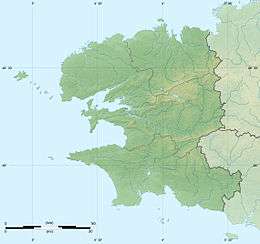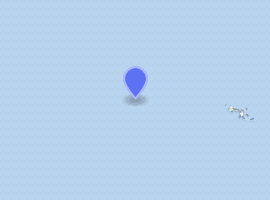Ar Men
Ar Men ("the rock" in Breton) is a lighthouse at one end of the Chaussée de l'Île de Sein, at the west end of Brittany. It shares its name with the rock on which it was erected between 1867 and 1881.
Lighthouse Ar Men in 2011 | |
 Location in Finistère  Ar Men (France) | |

| |
| Location | Off Île de Sein, Brittany, France |
|---|---|
| Coordinates | 48°3′0″N 4°59′54″W[1] |
| Year first constructed | 1867 |
| Year first lit | 1881 |
| Automated | 1990 |
| Construction | granite tower |
| Tower shape | cylindrical tower with balcony and lantern enclose keeper's quarter |
| Markings / pattern | white upper tower, unpainted lower tower and balcony, black lantern |
| Tower height | 32 m (105 ft) |
| Focal height | 37 m (121 ft) |
| Range | 23.5 nautical miles (43.5 km; 27.0 mi) |
| Characteristic | Fl (3) W 20s |
| Admiralty number | D0852 |
| NGA number | 0248 |
| ARLHS number | FRA-001 |
| France number | FR-0694[2] |
| Managing agent | Marine Nationale |
| Heritage | monument historique classé |
Ar Men is one of the best known lighthouses because of its isolated situation and the considerable difficulties its construction has presented, and the danger in evacuating its personnel. Considered as one of the most challenging workplaces by the community of lighthouse keepers, it has been named "The Hell of Hells" because of the severe conditions and exposure to the Atlantic.
History
In 1825, the need for a light built on one of the reefs of the Chaussee de Sein was already recognized, but it was thought impracticable to build. A commission was appointed in 1860 to look at the possibility of building a light, and after six years reported that a lighthouse should be constructed on the Ar Men. Despite the estimated 105 m2 (1,130 sq ft) of rock being uncovered at low water, work began in 1867. In the first year of work, workmen were able to land on the rock on only seven occasions and could spend a total of just eight hours drilling holes for the foundation.[3] At high tide the rock is completely submerged.
- Hours worked on the Ar Man lighthouse
| Year | Landings | Hours worked |
|---|---|---|
| 1867 | 7 | 8 |
| 1868 | 18 | |
| 1869 | 43 | |
| 1870 | 18 | |
| 1871 | 22 | |
| 1872 | 34 | |
| 1873 | 15 | |
| 1874 | 18 | 160 |
By 1879 the height of the tower was 33.5 metres (110 ft).[3]. The diameter at its base is 7.2 metres (24 ft) and the lighthouse was illuminated in 1881. In the following twenty years the tower was improved and reinforced. Keepers staffed Ar Men in 30-day shifts until automation. A two-way rope sling from the supply boat was used to transfer people to Ar Men. The lighthouse-keepers of the next shift were hoisted up before the outgoing keepers were brought down.
The light was automated and electrified on 10 April 1990, with a 250 watt halogen lamp. Its signal is three white flashes every twenty seconds, with an accompanying signal of three sounds every sixty seconds.
Generally the lighthouse is accessible only by helicopter or by boat if the seas permit.
References
- Geographic coordinates obtained from World Lighthouse On The Air (consult the list).
- Rowlett, Russ. "Lighthouses of Brittany: Southern Finistère". The Lighthouse Directory. University of North Carolina at Chapel Hill. Retrieved January 21, 2016.
- "The French "Wolf Rock Lighthouse" Off The Land's End Of Brittany". The Cornishman (59). 28 August 1879. p. 7.
External links
- Ar Men data sheet Ministère de la Culture (in French)

